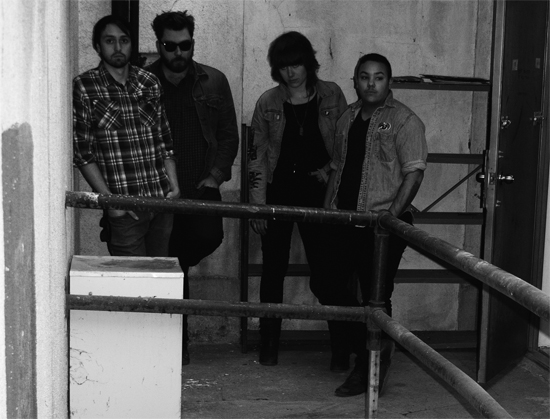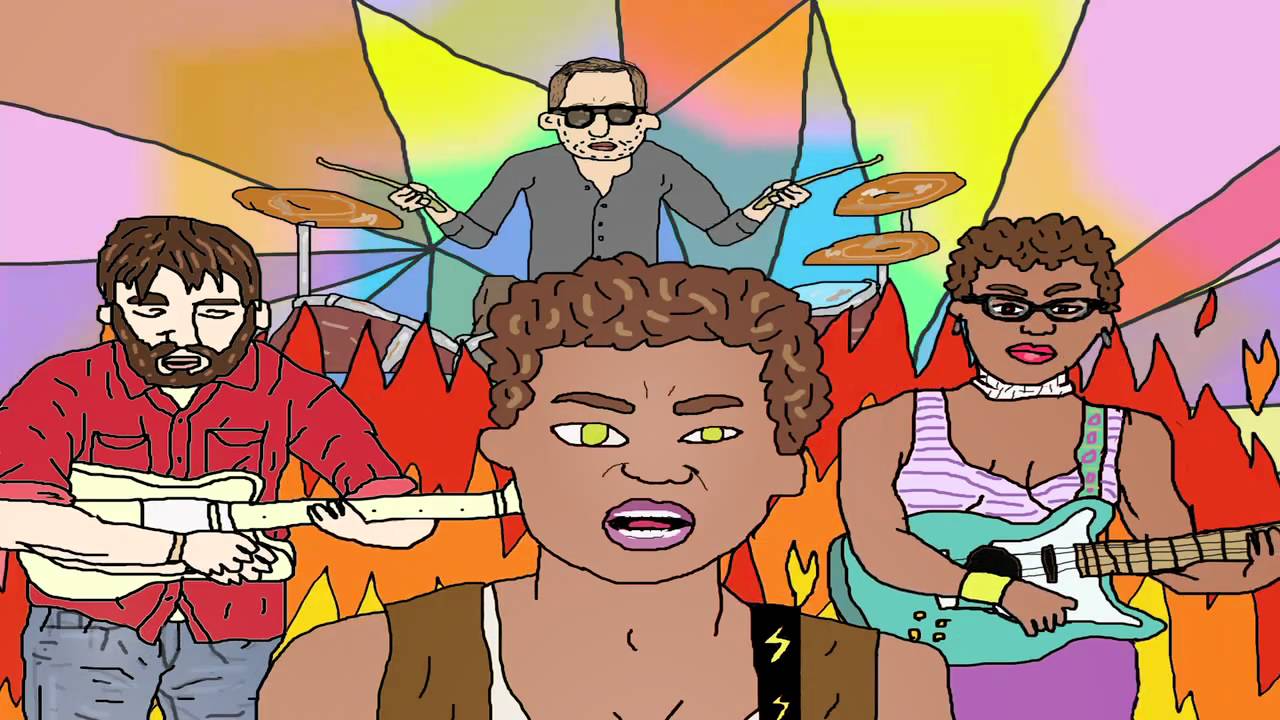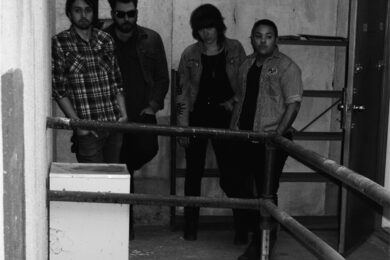Fist City are attention seekers worthy of your attention. From their name (which is only offensive if you take it there, you pervert) to their fondness for what at first glance appears to be occult imagery, the Canadian four-piece strike you as a fascinating bunch before you even start to contemplate their music – a hyperactive punk rock mêlée as joyous in mood as it is feral in lyrical content.
Since forming in 2009, the group have released two albums, the most recent of which – this summer’s It’s 1983, Grow Up – was first introduced to the UK when the band toured here this spring. It hasn’t, however, been the easiest of roads travelled. Guitarist Evan Van Reekum suffered a serious fall from a fourth floor window just ahead of its recording, and singer Kier ‘Fist’ Griffiths underwent gender reassignment surgery, both events that informed the making of the album.
Whilst the resulting record could understandably have been one of introspection or rage, its strongest sensation is one of catharsis. Due to its sheer sense of abandon, you imagine the lyrics to standout track ‘The Creeps’ ("Will you drive a little faster? I wanna die in a disaster") being delivered by one with eyes wider than the sky, and intimidating though it can be, it’s difficult to not get caught up in the rush.
When Griffiths isn’t hurrying along his own death – or perhaps playing characters who are – he’s lyrically more astute than you might initially give him credit for. Take ‘Boring Kids’, in which Fist City raise the subject of the mayor of their home town. Punk rock band talks politics is nothing new, sure, but the angle is slightly different from what you might expect: here they’re unleashing their wrath not on the politician, but on the opponents who ran a racist, homophobic smear campaign against him. Despite such insights being barked in Griffiths’ best Guy Picciotto-like yelp, you do have to work for the lyrics, buried as they are beneath a strange but exhilarating sort of wall of sound punk, imbued with unusual panache, conviction and melodic flair.
Speaking with the Quietus over the phone, Kier Griffiths explains that many in the punk rock community were supportive of his transition, although local fundamentalist Christian groups have been less approving, calling him a Satan worshipper and "reptilian hermaphrodite". He discusses how these personal experiences have been brought to bear on the music of Fist City, the influence of growing up in Canada’s Bible Belt and the importance of music as a conduit for joy and release.
You’ve just been to the UK for the first time, but it’s been four years since you formed. What’s different for Fist City these days, as opposed to 2009?
Kier Griffiths: Originally myself and my twin sister [Brittany Griffiths, bass] had this band called The New Danger Kids. Evan and Ryan [Grieve, drums] played in another band called Endangered Ape. We both broke up at the same time, and we’d been smitten with each others’ bands for years, so we decided to join forces. Immediately after we put up a couple of demos on the internet, this guy from Dead Beat wanted to put a record [Hunting You] out immediately, which put a fire up our butts. It was a very hasty beginning, very slapdash. These days, we’re a bit more into refining the sound, planning it out maybe a bit more. And we just got a new bass player, Lindsay Munro; my sister’s gone to Australia for a bit.
Reading about all the Satan worship and occult stuff ahead of hearing your records, I was surprised when I ended up hearing this quite joyous music. What made you want to present yourselves in that way?
KG: I guess our aesthetic is better matched to doom metal or something like that. In terms of the cult stuff, we live in a small town [Lethbridge, Alberta] on the Bible belt of Canada, with lots of people heavy on the religion. That just sparked an interest in cults in general. Here it’s so pervasive that it’s nice to take a piss and be all "Hail Satan!" once in a while. That really gets people going, which is really funny. The occult, Satan and shit. It’s cool stuff.
How did you come to be accused of Satan worship?
KG: We had this music video that was made by Colin Askey, for ‘Debbie Get Yr Boa’. There were all these flashing lights, really crude cartoon drawings, a totem pole, Michael Jackson barfing into someone else’s mouth, weird imagery of snakes. This fundamentalist Christian internet forum who hunt down Satanic people in the media saw it on Much Music, and thought they saw weird occult symbols.
Sounds like you wear it like a badge of honour, almost.
KF: Oh yeah. I’m definitely proud. I was so stoked the entire time reading it. Being labelled as a "reptilian hermaphrodite". Amazing. I love that. I want to get a patch that says "reptilian hermaphrodite". Fantastic, hilarious.
Does it worry you that people don’t see the inherent humour in that kind of way of presenting yourselves? Or are you trying to rile people?
KF: We definitely weren’t trying to rile people, but it’s hilarious that they were riled. I know there are some super religious people out there who are just so staunch that they can’t have any fun, but… whatever, the fact that they exist and made that little forum post, it gave me joy. So, they can exist. It’s fine.
All this talk of cults, and things like having your band’s name in your own surname now – would it be right to think there’s quite a gang mentality to Fist City?
KF: We’re pretty faithful to whatever we have going here. We each have Fist City tattoos. Lindsay and Brian did those on the road in the UK, just little stick and pokes. We don’t have matching jumpers and stuff like that, but it’s all in the works.
What’s the story behind the title of the album, It’s 1983, Grow Up?
KF: It was spray painted in an alley downtown. I assume it’d been there since 1983. Everyone knew about it, occasionally you’d get drunk and go take your photo with it, but it was painted over the year that we wrote the record. It’s a nod to this town and the scrappy times we had growing up in it. It’s one of those small towns that, after doing a lot of travelling, you see how unique it is to live here. Especially in a place that has more of a religious leaning, you meet a lot of people who really know the true meaning of straight up boredom. But there’s also a culture of growing up by doing your own thing, making your own fun. People from this town ended up being in bands because there was nothing else to do, and you were forced to find the other weirdos to hang out with.
You’ve been very open about your gender reassignment surgery. Did you ever consider not mentioning it at all, or did you always want it to be public knowledge?
KF: In the beginning I didn’t want it to be an issue. It’s an awkward process, transitioning and all. But I learnt pretty quickly that that’s impossible, being in a band. I found that, if I didn’t put my two cents in, that some very ignorant things were being printed. It made me a bit upset, so I decided, fuck it, it’s going to come out anyways. It’s also about positive images. There are not a lot of trans people out there in the punk scene. If I can be part of that, that’s pretty rad. If I was transitioning and I saw more trans people in the punk scene, I’d be pretty stoked.
I’ve always thought punk could be very receptive and open about some things, but also very cliquey and insular about others. What’s been your experience going through it all?
KF: I find that for the most part, to my face at least, everyone’s really accepting. It’s actually been a pretty positive experience. I feel like there’s a tendency to take transsexuality and give it this freaky, subversive connotation or label. I feel like that’s where people think that it fits, even though it’s far more complicated. That’s why it’s maybe a little more comfortable being part of the punk scene and being trans than it is being a banker or something. I think at some point you’ve just got to wear the badge with pride.
It doesn’t sound like any of you have exactly had the easiest of rides, and though there’s this aggression and power to your music, there’s also this real sense of positivity. Where does that come from?
KF: We like to make music that’s fun to dance and flail around to. It’s good to have something upbeat for that. We all have our tough times, but it’s fun to drench these sad whiney lyrics in this upbeat music, because it’s cathartic. If you have something you can bop your head to, it feels better than having sad droney music for your whiney life story, you know? Listen to the Four Tops, they’re heartbreaking.
But they sound like they’re frolicking in a meadow.
KF: Exactly.
There’s a point in ‘The Creeps’ where you sing "I wanna die in a disaster", in a way that makes the disaster sound like a really great time. It’s one of a few moments on the record that might touch on nihilism. Do you have that side to yourselves?
KF: I think we all do, a bit. Again, growing up in a small town, there’s always this feeling of being – not to be wickedly clichéd, but I’ll go there anyways – an outsider, having your youthful rebellion, and we’ve all done that. A couple of times we’ve each gone a bit over the line. Whatever it is – nihilism, sure – it’s definitely something we’ve all shared.
Do you think people should be looking to bands to say profound things, or is that kind of an old fashioned thing to look for from music now?
KF: I think it’s definitely seen as old fashioned. Nobody wants to be too serious – punk rock now is more about having fun, it seems. It’s really not political anymore. There’s so much that can and should be said, but I also feel like people just know all of that, people know that shit is shitty, and for the most part they want to get wasted and thrash about. I don’t know if people listen to the messages in punk rock music like they used to. That used to be the driving force, you’d have four chords and then you’d be calling out whatever government institution was crapping on you at that moment. There are a couple of songs where we talk about our mayor, and racism and assholes and fickle youth, but I don’t even know if people pick up on that.
The song where you address the mayor, though [‘Boring Kids’] – isn’t the personal message in it as strong as the political one?
KF: I’d agree with that. We don’t really get into picking apart policy or anything like that. These days, it seems like politics are so much more personal. There’s so much you can attach yourself to politically, you sort of have to have your own mini political identity. I think there’s this whole history of action being overwhelming, but being ineffectual. The Occupy movement, people rallying against the rip-off that was the financial crisis – you can say all you want, but nothing changes. I think people feel like whatever they do politically is ineffective. You can sign a million petitions a year on Facebook, but you get no real life reward from that. I think there’s less immediate satisfaction from being political these days, and that’s important, feeling like you can affect something. I think most kids these days probably don’t feel that.
Does music have any sway in changing that?
KF: Music’s a good way to get people together, get their juices flowing, get people talking. But we’re done with the days of having that monolithic rock star who can sway a whole group. Musicians and subcultures are so fragmented that there’s no one thing that big you can attach yourself to. Even the Occupy movement was fragmented inside of itself. There’s no big, effective beast.
Fist City’s It’s 1983, Grow Up is out now via Black Tent Press




